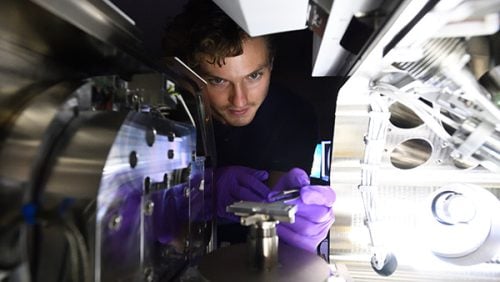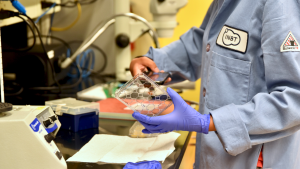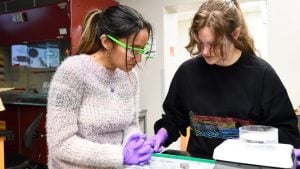Our Master of Science in Materials Science and Engineering program is one of the top-ranked programs in the nation. Study here, and you will have the opportunity to choose from several areas of focus in some of today’s most critical areas, conduct research in one of the world’s most advanced materials laboratory facilities, take part in a paid industry partnership as part of your curriculum, and work with leading scientists and clinicians from across Johns Hopkins University to solve pressing societal problems.
| Application deadlines | October 15 for spring 2026 admission February 15 for fall 2026 admission |
| Typical time to degree completion | Three to four full-time semesters |
| Tuition | $66,670 annually / $33,335 per semester |
| Funding support | More details here |
No GRE required, and no application fee.
What makes us unique?
-

Paid co-op
Gain real work experience and build professional connections while earning academic credit and a salary through the Institute for NanoBioTechnology’s Master’s Co-op Program.
-

Cutting-edge labs
Conduct research in the Materials Characterization and Processing lab, a $25 million state-of-the-art facility, unmatched in the world for studying materials at the atomic level.
-

Study in a top-ranked program
We are a top 20 program in U.S. News & World Report’s 2025 – 2026 graduate program rankings.
About our program
Academic tracks that meet your needs
Select from academic (non-thesis-based), research (thesis-based), or industry co-op-based courses of study.
You can tailor your studies to your specific interests
Acquire in-depth knowledge in areas relevant to your interests and goals
- Functional materials
- Biomaterials
- Computational materials
- Optoelectronic and magnetic materials
- Materials for energy
- Structural materials
- Polymers and composite materials
We offer the courses students want
Explore our most popular master’s courses, designed to provide real-world applications in materials science.
There are multiple academic pathways here
We seek students from varied academic backgrounds—from chemistry, physics, biochemistry, and other STEM disciplines—giving you a direct path to an engineering career, and maximizing earning potential for non-engineering majors.
We provide professional preparation and access
With a designated master’s graduate educator/advisor and access to an array of career networks and programs, graduate prepared for success in industry, research, or entrepreneurial ventures.
"I engaged not just at a surface level, but as a member of a team."
As a master’s student, Andrew Beamesderfer, Engr ’16, ’17 (MSE), began working at Becton Dickinson through the INBT’s co-op program. He joined the company full-time after graduating and has spent the past nine years advancing within the organization.
Outcomes-oriented
Our graduates are leaders in industry and entrepreneurs, working at the forefront of fields from aerospace, renewable energy, and government to biomaterials, health care, medicine and more.
According to Bureau of Labor Statistics, in 2024, the median salary in materials engineering was $108,000 with projected employment growth of 7% in the field by 2033.
Positions held by recent graduates include chemical engineer, cyber analyst, digital integration software engineer, process development research associate, and more.
Recent Employers |
||||||||
|
The MatSci Master's Student Experience
Faculty
Meet the faculty behind our field-leading research and in front of our classrooms Learn MoreIn the news...
Read about our latest achievements, new research tech, student highlights and more. Learn MoreCurrent MSE Requirements
The Department of Materials Science and Engineering offers two options for students pursuing a Master of Science in Engineering: an MSE degree with essay and an MSE degree without essay. Below, the requirements for each degree are detailed. Students interested in applying must adhere to the standard graduate admissions process.
The degree of Master of Science in Engineering with Essay is awarded subject to the recommendation of the student’s adviser and departmental approval, based on the satisfactory completion of the following requirements:
1. Three core courses in materials science and engineering*
- 510.601: Structure of Materials
- 510.602: Thermodynamics of Materials
- 510.603: Phase Transformations in Materials
Or take two combined courses:
- 510.606: Structure and Properties of Materials
- 510.612: Thermodynamics and Kinetics of Materials
Note that 510.606 and 510.612 may not be used in fulfillment of the requirements of the Ph.D. degree. Students who intend to pursue a Ph.D. in Materials Science and Engineering at Johns Hopkins should enroll in 510.601 and/or 510.602 instead.
*Starting Fall 2026, 510.601, 510.602, and 510.603 will be for PhD students only. Master’s students will take 510.606: Structure and Properties of Materials and 510.612: Thermodynamics and Kinetics of Materials as master’s core courses. Please email Patty McGuiggan at mcguiggan@jhu.edu for questions.
2. Between five and eight 600-level or higher and three 400-level or higher electives in materials science and engineering or related fields. All electives (600+ level and 400+ level) must follow the criteria below and outlined in the academic catalogue:
- Each elective must be worth at least three credits. Multiple courses that add up to three credits may be used in place of one three-credit course with approval from the Master’s Degree Committee.
- Up to two of the elective courses may be taken from the Engineering Programs for Professionals (EPP) part-time program.
- Up to two of the electives may be business courses.
- Any elective taken outside of the department (including all EPP courses) requires prior approval of the Master’s Degree Committee. The Master’s Degree Committee will determine the appropriate number of credits for any elective taken outside the Whiting School of Engineering.
- With the approval of the Master’s Degree Committee, the student may transfer up to two graduate courses from another institution. Students desiring such credit must make the request in writing to the Master’s Degree Committee by the end of the first semester after matriculation. This request must include a description of the course, a course syllabus, and documentation of the grade received. Please note that transfer coursework grades do not count towards calculation of the GPA.
3. Responsible Conduct of Research training (AS.360.624 or AS.360.625) in accordance with Whiting School of Engineering policy. Details about this requirement, including the criteria for determining whether the online or in-person course must be taken, are provided in the description of the policy.
4. Training on academic ethics in accordance with Whiting School of Engineering policy. This requirement can be satisfied by passing EN.500.603 (Academic Ethics).
5. A grade of C or better must be achieved in each course to obtain credit.
6. An overall grade point average of 3.0 or higher is required to earn the degree at the end of the program.
7. Attendance is required at the weekly Department of Materials Science and Engineering seminar (510.803/510.804) for two semesters. Seminar doesn’t count towards the course requirement.
8. A master’s essay or journal publication is required. A master’s essay must be approved by one faculty reader and conform to the requirements of the WSE Graduate Committee. For a journal publication, a student must submit to the Master’s Degree Committee an article describing his or her original research that has been published (or accepted for publication) in an archival, peer-reviewed technical journal. The student must be the primary author of the article. Research for the master’s essay or journal publication may be conducted with a corporate sponsor through the INBT Co-Op program.
Admission to the MSE program is through the standard graduate admissions process. The typical duration of the program is 21 months. The student’s transcript will reflect a Master of Science in Engineering with Essay.
The degree of Master of Science in Engineering (MSE) is awarded subject to the recommendation of the student’s adviser and departmental approval, based on satisfactory completion of the following requirements:
1. Three core courses in materials science and engineering*
- 510.601: Structure of Materials
- 510.602: Thermodynamics of Materials
- 510.603: Phase Transformations in Materials
Or take two combined courses:
- 510.606: Structure and Properties of Materials
- 510.612: Thermodynamics and Kinetics of Materials
Note that 510.606 and 510.612 may not be used in fulfillment of the requirements of the Ph.D. degree. Students who intend to pursue a Ph.D. in Materials Science and Engineering at Johns Hopkins should enroll in 510.601 and/or 510.602 instead.
*Starting Fall 2026, 510.601, 510.602, and 510.603 will be for PhD students only. Master’s students will take 510.606: Structure and Properties of Materials and 510.612: Thermodynamics and Kinetics of Materials as master’s core courses. Please email Patty McGuiggan at mcguiggan@jhu.edu for questions.
2. Between five and eight 600-level or higher and three 400-level or higher electives in materials science and engineering or related fields. All electives (600+ level and 400+ level) must follow the criteria below and outlined in the academic catalogue:
- Each elective must be worth at least three credits. Multiple courses that add up to three credits may be used in place of one three-credit course with approval from the Master’s Degree Committee.
- Up to two of the elective courses may be taken from the Engineering Programs for Professionals (EPP) part-time program
- Up to two of the electives may be business courses.
- Any elective taken outside of the department (including all EPP courses) requires prior approval of the Master’s Degree Committee. The Master’s Degree Committee will determine the appropriate number of credits for any elective taken outside the Whiting School of Engineering.
- With the approval of the Master’s Degree Committee, the student may transfer up to two graduate courses from another institution. Students desiring such credit must make the request in writing to the Master’s Degree Committee by the end of the first semester after matriculation. This request must include a description of the course, a course syllabus, and documentation of the grade received. Please note that transfer coursework grades do not count towards calculation of the GPA.
3. Responsible Conduct of Research training (AS.360.624 or AS.360.625) in accordance with Whiting School of Engineering policy. Details about this requirement, including the criteria for determining whether the online or in-person course must be taken, are provided in the description of the policy.
4. Training on academic ethics in accordance with Whiting School of Engineering policy. This requirement can be satisfied by passing EN.500.603 (Academic Ethics).
5. A grade of C or better must be achieved in each course to obtain credit.
6. An overall grade point average of 3.0 or higher is required to earn the degree at the end of the program
7. Attendance is required at the weekly Department of Materials Science and Engineering seminar (510.803/510.804) for two semesters. Seminar does not count towards the course requirement.
Admission to the MSE program is through the standard graduate admissions process. The student’s transcript will reflect a Master of Science in Engineering.
Imagine yourself here
Baltimore has so much to offer. From vibrant and diverse neighborhoods with affordable housing, a farmers' market, excellent restaurants and the Baltimore Museum of Art just blocks from campus to professional sports teams, a rich history and a lively culture scene, make Baltimore a great place to call home.
Ready To Apply?
Get the information you need about our application process and financial aid, or get your application started today!
Only at Johns Hopkins
Explore materials at every scale - Gain hands-on experience in the Johns Hopkins Materials Characterization and Processing Lab (MCP), one of the world’s leading centers for atomic-level materials research.
Launch your career - Earn academic credit and industry experience through a six-month paid internship through the Institute for NanoBioTechnology’s Master’s Co-op Program.

A transformational investment in data science and AI - We are building a national epicenter for research and education focused on emerging applications, opportunities, and challenges presented by data science, machine learning, and AI, including materials engineering.
Faculty Spotlight
Hai-Quan Mao, professor of materials science and engineering and biomedical engineering and director of JHU’s Institute for NanoBioTechnology, is working to create more potent mRNA-based immunotherapies to target solid tumors and metastatic cancers.
Mao’s research focuses on nanomaterials for delivery of therapeutics and mRNA-based immunotherapies and stem cell engineering applications, and he is renowned for his work engineering novel nanomaterials for regenerative medicine and therapy delivery.






